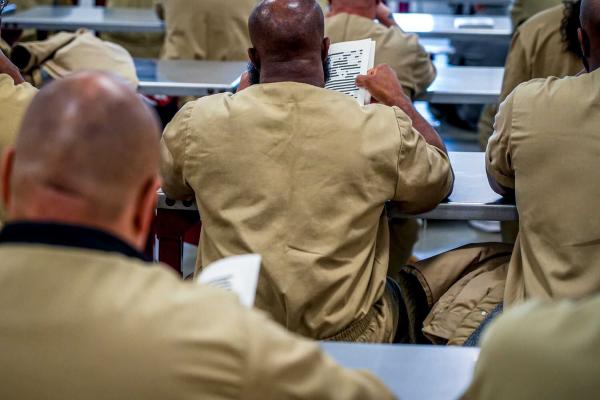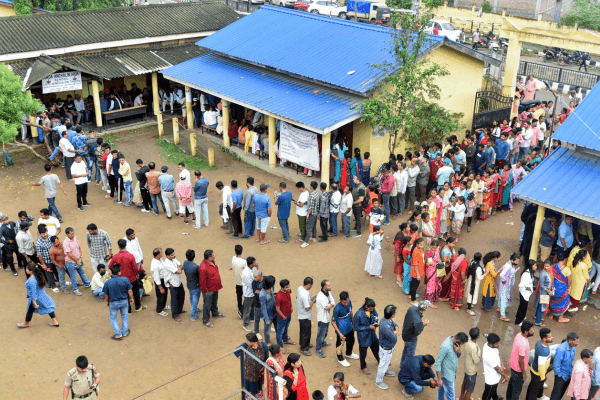On Nov. 4, more than 275,000 people across Florida finished their church services knowing that their spiritually motivated civic duty was just beginning for the day. Clergy led their congregants from their churches to their polling stations to cast their early ballots. Some went arm-in-arm singing hymns. Others loaded up their church vans and buses. Clergy used these events as sermonic notes that discussed the spiritual importance of engaging civically.
Souls to the Polls is a time-honored tradition, often led by clergy, to activate and engage congregants to exercise their right to vote that starts long before Election Day. It is a mobilization strategy to make the process of voting easier for their congregants. But sadly, voter suppression efforts targeting minorities in subtle and overt ways continue to make Souls to the Polls a critical service — placing the burden of voter education and empowerment on the backs of churches and other civil society organizations, not the government.
Shevrin Jones, a state representative from Florida’s 101st district located in Broward County, tells me: “When it comes to voting rights, not just in Florida, but nationally, when we look at voter suppression, we must do double work for African Americans.” This is what organizations bent on turning out voters must contend with: “double work.”
As Jones puts it, “we have to hold the very individuals in charge of elections accountable” so that blacks can actually vote. According to Florida’s secretary of state, early voting starts on the tenth day before the election and ends on the third day before the election, but county supervisors can add even more days.
However, the fate of early voting has not always been secure in Florida. Reporting from the Palm Beach Post revealed that the “state’s voter ID law was devised to suppress Democratic votes.” And even more, former state GOP chairman, Jim Greer, admitted that his consultants told him, “we’ve got to cut down on early voting because early voting is not good for us.”
For Jones, Souls to the Polls is an opportunity not just to encourage voters to vote, but to put on notice the governor, secretary of state, and county supervisors of elections that their rights, especially as black voters should not be abridged. Jones said, “we were requesting that the secretary of state extend early voting times to accommodate for more voters.”
Jones was involved in Souls to the Polls by recruiting and enlisting pastors in the effort: “We still see voting as not only important but a requirement considering where we come from,” alluding to the not-so-distant history of blacks being explicitly excluded from voting.
In reflecting on Florida’s Souls to the Polls efforts, Jones raved about Pastor Rhonda Thomas. Thomas serves as co-pastor of New Generation Baptist Church in Miami. Somehow, she still finds time to serve as the statewide coordinator for Souls to the Polls for Faith in Florida, and as the campaign manager for Let My People Vote, a faith-based movement to organize local communities of faith across the state to educate voters on the importance of their vote and Amendment 4 (a referendum which ultimately restored the voting rights of more than 1.4 million former felons).
Thomas engaged 827 Florida congregations for the Souls to Polls initiative in November. She spent her time educating pastors who in turn educated their congregants and held joint events that turned out those 275,000 voters. And while that number may seem insignificant relative to Florida’s 13 million registered voters, Andrew Gillum lost the gubernatorial race by slightly over 32,000 votes. These efforts can tip the balance.
Pastor Thomas’ earliest memories of the genesis of Souls to the Polls date back to Dec. 17, 1979. Arthur McDuffie, an unarmed black man in Miami, was pursued during a high-speed chase and then subsequently killed as a result of a brutal beating by the police. After the white police officers were acquitted, riots started on May 18, 1980. Pastor Thomas remembers that we “recognized the need to put someone in office who cared about our concerns as African Americans. There was no early voting at that time. There were no funders at that time to make it happen. A group of clergy decided they would take the congregations to vote on a Tuesday.”
For Thomas, the “double work” will not stop her. For instance, the county supervisor of elections in the Treasure Coast area of Florida unilaterally decided to close the polls earlier than expected on the day of early voting. Her response was simple, clear, and limited to two short sentences: “It won’t deter us, we’ll have service at the polls. You may limit us, but you won’t stop us.”
While double work doesn’t dissuade leaders like Jones and Thomas, we must consider whether this double work is the byproduct of increasing complexity and difficulty in accessing the franchise. Florida is not alone.
Double work in Alabama is par for the course for Faith in Alabama and its leader Daniel Schwarz. He said, “the most pernicious form of voter suppression is mass incarceration.” Instead of waiting for the state to notify ex-felons of their restored voting rights, Schwarz’s organization walks through voter restoration forms with ex-felons, one by one. And the organization’s “28,000 calls to infrequent African American voters” counteract the state’s penchant for purging voters.
In seven states, inclusive of Alabama and Florida, Souls to the Polls initiatives have become even more intricate through an initiative called Lawyers and Collars. Led by Rev. Terrance McKinley at Sojourners, this initiative “brought together a coalition of folks who recognized that voter suppression diminishes the other,” engaging approximately 1,300 clergy in seven states. McKinley told me, “we wanted to protect the vote but also make sure people were engaged.” They brought clergy together with attorneys “who could immediately address legal problems at the polls.” McKinley mentioned that they hosted “We Are Watching” meetings where clergy met with four secretaries of state.
These Souls to the Polls efforts in states around the country will continually need to contend with ever-disparaging voter suppression efforts. What once was a simpler effort to collectively vote as a congregation on a day of early voting, might have to become a more intensive multiprong initiative to educate voters about the intricacies of executing on their fundamental right to vote. The sheer growth in expertise and intensity of these efforts might signal the ever-growing difficulty in casting a ballot.
Got something to say about what you're reading? We value your feedback!







